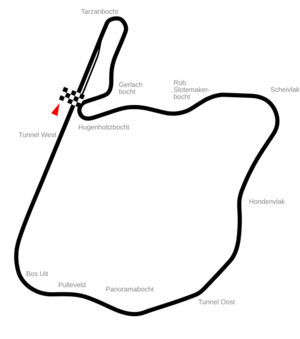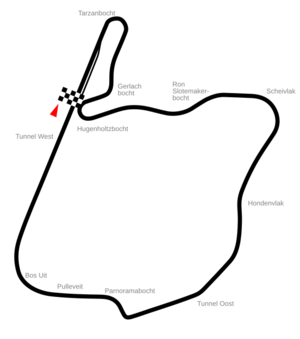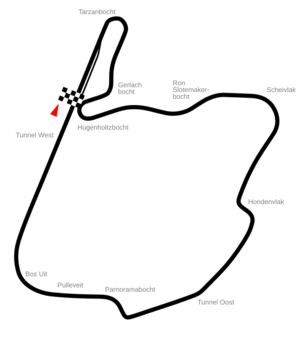Dutch Grand Prix facts for kids
| Circuit Zandvoort (intermittently; 1950–1985, 2021–present) |
|
|
.
|
|
| Race information | |
|---|---|
| Number of times held | 36 |
| First held | 1950 |
| Most wins (drivers) | |
| Most wins (constructors) | |
| Circuit length | 4.259 km (2.646 mi) |
| Race length | 306.587 km (190.504 mi) |
| Laps | 72 |
| Last race (2024) | |
| Pole position | |
|
|
| Podium | |
|
|
| Fastest lap | |
|
|
The Dutch Grand Prix (which means "Grand Prix of the Netherlands" in Dutch) is an exciting annual Formula One car race. It takes place at the Circuit Zandvoort in the Netherlands. This race was held every year from 1950 to 1985. After a long break of 35 years, it returned in 2021 and is planned to continue until 2026.
The Dutch Grand Prix became part of the official Formula One World Championship in 1952. Sometimes, it was even given the special title of European Grand Prix. This title was an honor given to one important race in Europe each year. The Dutch Grand Prix is also unique because it has its own music track called Lights Out. This song is played after the national anthem at the race.
The Story of the Dutch Grand Prix
How the Zandvoort Track Began
The town of Zandvoort is on the coast of the North Sea in the Netherlands. It is quite close to the famous city of Amsterdam. In the 1930s, there were small races on the town's streets. During World War II, a straight road was built through the sand dunes by the Germans. This road was for victory parades. Later, it was connected to other roads that led to coastal defenses.
After the war, some of these roads were made wider and linked together. This is how the racing circuit was designed. It wasn't designed by just one person, but by a group of experts from the Royal Dutch Motorcycle Association. They got advice from S. C. H. "Sammy" Davis, a famous race car driver. The very first race happened in 1950. The races in 1950 and 1951 were not yet part of the Formula One championship. Louis Rosier won both of those early races.
Early Formula One Races
The year 1952 was special because the Dutch Grand Prix officially joined the Formula One World Championship. Italian driver Alberto Ascari won the races in 1952 and 1953. The race was not held in 1954 because there wasn't enough money. In 1955, Mercedes-Benz cars were very strong. Argentine driver Juan Manuel Fangio and British driver Stirling Moss were the top drivers. Moss stayed very close to Fangio throughout the race.
The races in 1956 and 1957 were also cancelled due to money problems. In 1958, Stirling Moss won in a Vanwall car. 1959 saw Swede Jo Bonnier win his only Formula One race. In 1960, Dan Gurney had an accident, and sadly, a spectator was hurt. Jack Brabham won that race in a Cooper.
From 1963 to 1965, the amazing British driver Jim Clark won three races in a row. In 1967, a new car, the Lotus 49, was introduced. It had a powerful new Ford-Cosworth DFV engine. This engine won its first race with Jim Clark driving. It became one of the most successful engines in Formula One history.
The 1970 race was won by Jochen Rindt in a Lotus car. However, a sad accident happened during this race. British driver Piers Courage crashed his car and it caught fire. This led to important discussions about making racing safer. The 1971 race was won by Jacky Ickx in a Ferrari in rainy conditions. The race was not held in 1972. Drivers felt the track and its facilities were not safe enough for Grand Prix racing at that time.
Safety Improvements and Challenges
Before the 1973 race, the Zandvoort track was greatly improved. Safety barriers were added to protect cars from the sand dunes. New pit areas were built, and a new chicane (a series of tight turns) was added to slow cars down before a very fast corner. Everyone was excited about the improved track.
However, the 1973 race became another sad moment in Zandvoort's history. On the eighth lap, British driver Roger Williamson crashed, and his car caught fire. He was not hurt in the crash, but he could not get out of the burning car. His fellow driver, David Purley, bravely stopped his own car and ran to help. Purley tried very hard to turn Williamson's car upright and pull him out. Sadly, he couldn't do it alone, and the track marshals were not prepared to help due to the intense heat. Race officials were confused and thought it was Purley's car that had crashed. Many drivers did not realize another car was involved. The race continued while Purley tried desperately to save Williamson. Sadly, Williamson passed away from smoke inhalation. David Purley was later given a special award, the George Medal, for his incredible bravery. Jackie Stewart won that race, but no one felt like celebrating. This event led to major changes in safety rules and how marshals are trained in Formula One.
More Exciting Races and the Track's Changes
In 1974, the Ferrari team was strong, and Austrian driver Niki Lauda won. 1975 saw British driver James Hunt win his first Formula One championship race. Hunt won again in 1976. The 1977 race is remembered for an incident between Hunt and American driver Mario Andretti. They touched cars while battling for position and both had to leave the race. Andretti won the 1978 race, which was his last Formula One victory.
In 1979, the track was changed again to slow cars down. A temporary chicane was added. Canadian driver Gilles Villeneuve had an amazing moment in this race. After damaging his car, he drove it back to the pits with a broken wheel, showing incredible car control! Alan Jones won that race. The chicane was changed again for 1980.
1981 saw a big fight between French driver Alain Prost and Alan Jones, with Prost winning. 1982 was won by French driver Didier Pironi. His countryman René Arnoux had a big crash but was thankfully uninjured. In 1983, there was a battle between championship rivals Prost and Brazilian driver Nelson Piquet. Prost won from pole position in 1984. The 1985 was Niki Lauda's 25th and final Grand Prix victory. He held off his teammate Alain Prost to win.
The 1985 race was the last one for a long time. The company that ran the circuit went out of business. Part of the track was even sold off. However, the track was later redesigned and continued to be used for other types of motorsport.
The Grand Prix Returns: 2021-2026
On May 14, 2019, it was announced that the Dutch Grand Prix would return to the Formula One calendar in 2020. However, the event was postponed and then cancelled for 2020 due to the COVID-19 pandemic. It finally returned in 2021. The home favorite, Max Verstappen, won that race. Verstappen continued his winning streak, also winning the 2022 and 2023 races.
In 2024, British driver Lando Norris broke Verstappen's winning streak at Zandvoort. Norris took pole position and won the race. The Dutch Grand Prix is scheduled to be held at Zandvoort until 2026. After that, the race might not be part of the Formula One calendar anymore, as the local organizers have decided not to extend the contract.
Race Winners
Drivers with Multiple Wins
Here are the drivers who have won the Dutch Grand Prix more than once. Races with a pink background were not part of the Formula One World Championship.
| Wins | Driver | Years won |
|---|---|---|
| 4 | 1963, 1964, 1965, 1967 | |
| 3 | 1968, 1969, 1973 | |
| 1974, 1977, 1985 | ||
| 2021, 2022, 2023 | ||
| 2 | 1950, 1951 | |
| 1952, 1953 | ||
| 1960, 1966 | ||
| 1975, 1976 | ||
| 1981, 1984 | ||
| Source: | ||
Winning Car Manufacturers
This table shows which car manufacturers (constructors) have won the Dutch Grand Prix the most times. Teams in bold are currently competing in Formula One.
| Wins | Constructor | Years won |
|---|---|---|
| 8 | 1952, 1953, 1961, 1971, 1974, 1977, 1982, 1983 | |
| 6 | 1963, 1964, 1965, 1967, 1970, 1978 | |
| 4 | 1976, 1984, 1985, 2024 | |
| 3 | 2021, 2022, 2023 | |
| 2 | 1950, 1951 | |
| 1959, 1962 | ||
| 1968, 1969 | ||
| 1966, 1980 | ||
| Source: | ||
Winning Engine Manufacturers
This table shows which engine manufacturers have powered the winning cars at the Dutch Grand Prix. Manufacturers in bold are currently competing in Formula One.
| Wins | Manufacturer | Years won |
|---|---|---|
| 10 | 1967, 1968, 1969, 1970, 1973, 1975, 1976, 1978, 1979, 1980 | |
| 8 | 1952, 1953, 1961, 1971, 1974, 1977, 1982, 1983 | |
| 4 | 1960, 1963, 1964, 1965 | |
| 2 | 1950, 1951 | |
| 1955, 2024 | ||
| 1959, 1962 | ||
| 1984, 1985 | ||
| Source: | ||
- Designed and built by Cosworth, funded by Ford
-
- Built by Porsche
Winners by Year
All Dutch Grand Prix races have been held at Zandvoort.
- A pink background means the event was not part of the Formula One World Championship.
See also
 In Spanish: Gran Premio de los Países Bajos para niños
In Spanish: Gran Premio de los Países Bajos para niños
 | Toni Morrison |
 | Barack Obama |
 | Martin Luther King Jr. |
 | Ralph Bunche |




